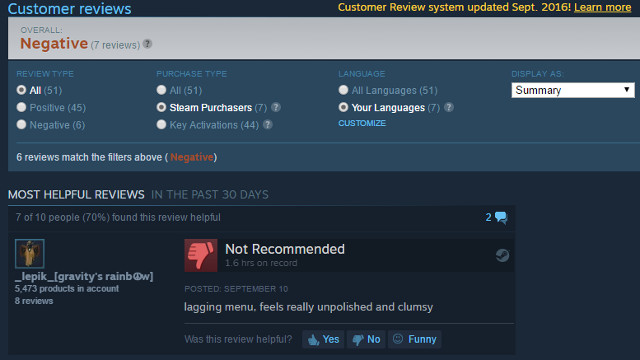For many years now, any Steam user who owns a game on the platform has been able to review it, providing contribution to its average review in the process. While this makes sense for the average user, many game publishers have found that when they give free copies to press they, in almost all cases, earn a positive recommendation in the process. On top of this, it is common for the publisher to grant keys to in-house employees who are sometimes developers responsible for the game, which leads to even further inflated recommendations.
Previous to this week's changes Valve has asked that users that are given a key should tag their review as such. However, it learned over time that it simply wasn't enough to ask reviewers to be ethical. As a result, this week Valve deployed a major overhaul to its customer review system that has shaken up how reviews are interpreted and read by prospective consumers.

By default, the new system will hide reviews written by users who used a publisher granted key rather than purchasing the game, only allowing reviews written by accounts that used a free game key to be seen if a consumer specifically specifies that they wish to see them. This change has ensured that the only reviews contributing to the average review score are those that were obtained through conventional means.
[ Editor's Note: Only copies purchased on the Steam Store are able to contribute to "Steam Purchasers" reviews. This change does affect users who obtain keys from other trustworthy sources such as Humble Bundles and Kickstarter, which has resulted in frustration among many members of the PC gaming community. ]
The moment that the change was deployed to the Steam Store more than 90% of games saw a reduction in their review average. Some games have been hit much harder than others, though. Take for example Simple Ball: Extended Edition, which dropped from 88% to 14%, a change of 74%. Lands of Devastation saw a similar drop from 86% to 16%.
As compiled by a user on a Google Document, here are the games that were most affected by the change:
| Game | Old Score | New Score | Change |
| Simple Ball: Extended Edition | 88% | 14% | 74% |
| Lands of Devastation | 86% | 16% | 70% |
| Bathory: The Bloody Countess | 93% | 25% | 68% |
| Zombies on a Plane | 73% | 11% | 62% |
| SizeBlock | 88% | 31% | 57% |
| The Last Hope | 80% | 23% | 57% |
| War Truck Simulator | 75% | 18% | 57% |
| Epsilon Corp. | 76% | 26% | 50% |
| Worst Case Z | 90% | 40% | 50% |
| Matris | 98% | 50% | 48% |
The good news is that virtually all of the most affected games are smaller indie titles with only a small handful of reviews. AAA titles with high costs have been affected very unsubstantially. That said, AAA titles are usually most affected by review score manipulation during the early days following release, making this change instrumental to providing a much more pro-consumer climate during launch windows.
There's always the case to be made that review scores written by other people should never be trusted, that review score averages are deceiving, and that there are so many joke reviews on Steam that the review system might as well not even exist. But ultimately, being able to read the impressions of hundreds if not thousands of other consumers prior to purchase is something with tremendous value, and Valve seems to agree.
It's fair to say what Valve has delivered here is something very intelligently designed, and will go a long way toward weeding out one element of bad ethics in the gaming industry.







